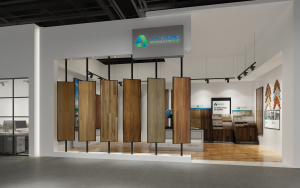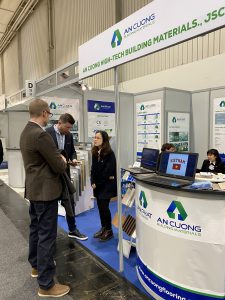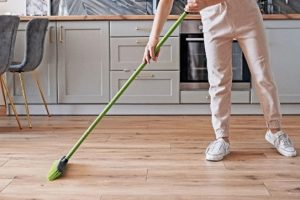Kitchen floors have a lot to contend with, and when it’s a commercial kitchen the potential perils are compounded. That’s why you have to find a material that is durable, water- and stain-resistant, and easy to clean. When kitchens are visible to the public, the kitchen flooring also has to match or complement the front-of-house flooring and decor. But above all, commercial kitchen flooring must be sanitary and comply with local health and building code requirements.
Tile
Tile is one of the most common types of commercial kitchen flooring. It is a highly durable, stain-resistant, easy-to-clean flooring material that can be very cost-competitive. Made from clay fired at high temperatures in an industrial kiln, tiles are very hard and impact-resistant.
The primary type of tile used in commercial kitchens is quarry tile, an unglazed clay tile with a naturally slip-resistant texture. Quarry tile comes in a limited range of colors, from reddish-brown to tan to gray, and usually has a standard square shape. It is not the most beautiful flooring option, but it is one of the most cost-effective and durable, and its slip-resistance makes it appropriate for any kitchen environment.
Glazed ceramic tile, similar to tile used in homes, is available in many more colors and styles than quarry tile, and its glazed surface can be virtually impervious to water and many staining agents. However, the glazed ceramic tile used in kitchens must be sufficiently slip-resistant to meet code standards.
Commercial Vinyl SPC Flooring
Vinyl SPC Flooring is a sturdy material, which means that it is durable when it is laid on a good subfloor.
If it is installed over something hard, like concrete, you get a floor that is hygienic and easy to clean but is only moderately durable and resistant to damage.
In some cases, vinyl SPC flooring includes an underlayment layer that will help greater comfort and reduce fatigue.

Available in planks or tiles, vinyl SPC flooring is one of the easiest flooring materials to install. Planks vinyl has very few seams, making it less vulnerable to water damage and edge damage than vinyl SPC tile.
Natural Stone
Natural stone tile is used in some commercial kitchen environments, particularly when appearance is a top priority. Stone flooring is durable and hard, like quarry tile and ceramic tile, but it can be much more expensive and can be relatively high-maintenance. Unlike quarry and ceramic tile, all stone tiles must be sealed to prevent stains and discoloration.
Stone tile must be chosen very carefully for use in a kitchen. It must be relatively smooth and flat and not have deep surface variations that can become trip hazards. Most importantly, stone tile floors must be slip-resistant even when wet. Polished stone is much too slippery for the kitchen environment.
Concrete
Poured concrete is a classic option for both kitchen and front-of-house flooring. Concrete is incredibly durable and can be finished with a variety of surface textures and visual effects, including decorative colors and inlays. Concrete is hard, flat, and seamless and cannot be damaged by heat or most impacts. It’s also surprisingly versatile and can work for a range of restaurant styles.
Concrete is porous and must be sealed periodically to resist stains and discoloration from food and oils. Like all types of tile, concrete is also hard underfoot, which is why many kitchens use rubber mats or tiles to soften concrete flooring in key work areas.









